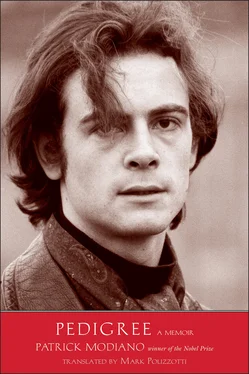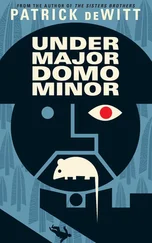In those years, 1957 and 1958, another of his cronies appeared, a certain Jacques Chatillon. I saw him again twenty years later, by which point he was calling himself James B. Chatillon. At the start of the Occupation he had married the granddaughter of a merchant whose secretary he was, and during that time he had been a horse trader in Neuilly. He sent me a letter in which he talked about my father: “Don’t be upset that he died alone. Your father didn’t mind being alone. He had great imagination — though to be honest, entirely devoted to his business — that he nourished carefully and that nourished his mind. He was never alone, for he was always ‘conspiring’ with some scheme or other, and that’s what gave him that strange air that many found so unnerving. He was curious about everything, even things he didn’t agree with. He managed to give an impression of calm, but he could easily turn violent. When something annoyed him, his eyes would flash. He opened them wide, instead of keeping them hidden under his heavy eyelids. Above all, he was a dilettante. What always shocked his contacts the most was his reluctance to speak, to make himself clear. He would mumble a few allusions … punctuated with one or two hand gestures and a ‘there you have it’ … then clear his throat once or twice to top it off. Along with his reluctance to speak went his reluctance to set things down on paper, which he explained away as being due to his illegible handwriting.”
James B. Chatillon wanted me to write the biography of a friend of his, a Corsican mobster named Jean Sartore, who had just died and who’d associated with the Rue Lauriston gang and its boss, Lafont, during the Occupation. “I sincerely regret that you couldn’t write Jean Sartore’s memoirs, but you’re wrong to think he was an old friend of Lafont’s. He used Lafont as a screen for his gold and currency smuggling, since the Germans were after him even more than the French. That said, he knew plenty about the Lauriston bunch.”
In 1969, after my second novel came out, he had phoned me and left a name and number where I could reach him. It was in care of a M. de Varga, who was later implicated in Jean de Broglie’s murder. I remember one Sunday when we walked around Mont Valérien, my father and I and this Chatillon, a stocky, brown-haired fellow, with lively black eyes under pale lids. He drove us there in an old Bentley with collapsed leather seats — the only asset he had left. After a while, he had to part with that, too, and would come to the Quai de Conti on a moped. He was deeply devout. I once asked him, provocatively, “What good is religion, anyway?” He had given me a biography of Pope Pius XI with this inscription: “For Patrick, so that he might learn ‘what good religion is’ …”
Often my father and I were alone on Saturday evenings. We saw movies at the Champs-Elysées and the Gaumont Palace. One afternoon in June, we were walking — I don’t remember why — on Boulevard Rochechouart. The sun was very strong and we retreated into the darkness of a small movie house, the Delta. At the George V cinema, there was a documentary on the Nuremberg Trials, Hitler’s Executioners: at age thirteen, I discovered images of the extermination camps. Something changed for me that day. And what did my father think? We never talked about it, not even as we left the theater.
On summer nights we would get ice cream at Ruc or the Régence. Dinner at L’Alsacienne on the Champs-Elysées, or at the Chinese restaurant on Rue du Colisée. In the evening, on the dark red leather-covered record player, we’d listen to test pressings of vinyl records he wanted to put on the market. And on his bedside table, I remember one book: How to Make Friends , which today helps me understand his solitude. One Monday morning during the holidays, I heard steps on the inner staircase leading to the fifth floor, where my room was. Then voices in the large bathroom next door. Bailiffs were carting away all of my father’s suits, shirts, and shoes. What ploy had kept them from repossessing the furniture?
Summer vacations in 1958 and 1959 in Mégève, where I was alone with a young girl, an art student who watched over me like a big sister. The Hôtel de la Résidence was closed and looked abandoned. We crossed through the unlit lobby to use the pool. After 5 P.M., an Italian orchestra played around that pool. A doctor and his wife had rented us two rooms in their house. Strange couple. The wife, a brunette, seemed crazy. They had adopted a girl my age, sweet like all unloved children, with whom I spent afternoons in the deserted classrooms of the nearby school. Beneath the summer sun, a smell of grass and asphalt.
Easter holidays, 1959, with a schoolmate who took me to Monte Carlo, so I wouldn’t be left alone at the boarding school; we stayed with his grandmother, the marquise de Polignac. She was American. I later found out that she was a cousin of Harry Crosby, the publisher of Lawrence and Joyce in Paris, who killed himself at age thirty. She owned a black car with front-wheel drive. Her husband dealt in champagne, and before the war they had socialized with Joachim von Ribbentrop, when he too was a champagne salesman. But my friend’s father was a former Resistance member and a Trotskyite. He wrote a book about Yugoslavian Communism with a preface by Sartre. I’d learn all this later. In Monte Carlo, I spent entire afternoons at the marquise’s, leafing through photo albums she’d put together, starting in the 1920s, illustrating the easy, carefree life she and her husband had led. She wanted to teach me how to drive and gave me the wheel of her 15 HP on a sharply twisting road. I missed a turn and we nearly went hurtling into the void. She brought us to Nice, her grandson and me, to see Luis Mariano at the Pinder Circus.
Stays in Bournemouth, England, in 1959 and 1960. Verlaine once lived in that area: scattered red cottages amid the foliage and white villas along the seafront … I don’t expect to return to France. I’ve had no word from my mother. And I think it suits my father for me to stay in England longer than planned. The family I’m lodging with can’t keep me any longer. So I show up at a hotel reception desk with the three thousand francs I possess, and they let me sleep free of charge in an unused sitting room on the ground floor. Then the headmaster of the school where I study English in the mornings puts me up in a kind of broom closet under the stairs. I run away to London. I arrive at Waterloo Station that evening. I cross Waterloo Bridge. I’m terrified at being alone in this city that seems so much bigger than Paris. From a red phone booth in Trafalgar Square, I call my father collect. I try to hide my panic. He doesn’t sound very surprised to learn I’m in London on my own. He wishes me good luck, in an indifferent voice. At a small hotel in Bloomsbury, they agree to give me a room, even though I’m a minor. But just for one night. And the next day, I try my luck at another hotel, near the Marble Arch. There, too, they look the other way at my being fifteen and give me a tiny room. This was still the England of the Teddy boys and the London where seventeen-year-old Christine Keeler had just arrived from the suburbs. Later, I learned that she worked, that same summer, as a waitress in a small Greek restaurant on Baker Street, right near the Turkish place where I used to eat in the evening before my anxious walks down Oxford Street. “And De Quincey sipping / Sweet opium chaste and poisonous / Brooded on his unhappy Anne …”
One night in September 1959, with my mother and one of her friends, in the Koutoubia, an Arab restaurant on Rue des Ecoles. It’s late. The restaurant is empty. It’s still summer. The weather is hot. The street door is wide open. In those strange years of my adolescence, Algiers was an extension of Paris, and Paris was washed by the waves and echoes of Algiers, as if the sirocco blew over the trees in the Tuileries, bringing sand from the desert and beaches … In Algiers as in Paris, the same Vespas, the same movie posters, the same songs in the café jukeboxes, the same Renault Dauphines in the streets. The same summer in Algiers as along the Champs-Elysées. That evening at the Koutoubia, which city were we in? Some time later, they bombed the Koutoubia. One evening in Saint-Germain-des-Prés — or was it Algiers? — they bombed the Jack Romoli menswear shop.
Читать дальше












